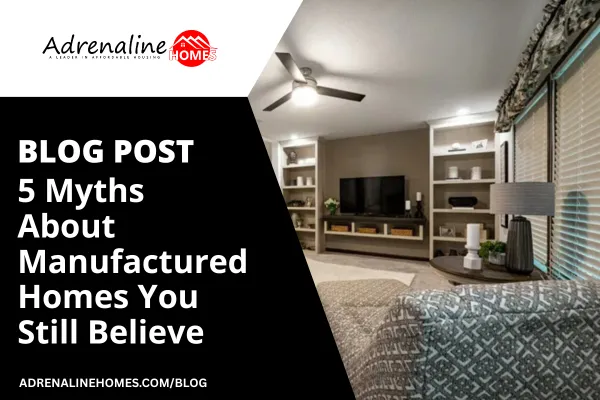
5 Myths About Manufactured Homes You Still Believe

Introduction
If you’re like many homebuyers, the phrase manufactured home might bring to mind outdated stereotypes — boxy trailers, low-quality materials, or cookie-cutter designs. But here’s the truth: today’s manufactured homes are light-years ahead of those old images. Built to rigorous federal standards, designed with customization in mind, and offering the same comfort and durability as traditional homes, they’ve become one of the smartest paths to affordable homeownership.
Still, myths persist — and they’re stopping too many people from discovering how great manufactured homes really are. Let’s debunk five of the biggest misconceptions holding buyers back.
Myth #1: Manufactured Homes Are Poor Quality or Flimsy
This is probably the most common misconception — that manufactured homes are cheaply built or won’t last. But modern manufactured homes must meet the HUD Code, a strict federal building standard regulating everything from structural strength and insulation to fire safety and energy efficiency.
They’re built in climate-controlled factories with precision equipment, meaning every wall, seam, and joint is inspected multiple times for quality control. The result? Consistent craftsmanship that’s actually less prone to on-site errors than traditional construction.
With proper maintenance and installation on a solid foundation, a manufactured home can last just as long as — and in some cases, longer than — a site-built home.
Myth #2: Manufactured Homes Lose Value Like Cars
While older mobile homes may have depreciated quickly, today’s manufactured homes are a completely different story. When installed on owned land and maintained well, they can appreciate in value just like traditional homes.
In fact, location, upkeep, and the local housing market play a much bigger role in long-term value than the construction type itself. As more buyers seek affordable, sustainable options, demand for modern manufactured homes continues to rise — which only strengthens their resale value.
Myth #3: Manufactured Homes Can’t Be Customized
A common misconception is that buying a manufactured home means settling for a cookie-cutter design. In reality, most manufacturers — including Adrenaline Homes — offer hundreds of floorplans and customization options.
From open-concept kitchens and spa-style bathrooms to smart-home technology and energy-efficient upgrades, buyers can personalize nearly every aspect of their home. You can even choose finishes, materials, and layouts that fit your lifestyle and budget.
The days of “one-size-fits-all” manufactured homes are long gone — today, you can design a home that feels uniquely yours.
Myth #4: Manufactured Homes Aren’t Safe in Harsh Weather
This myth lingers mostly because of decades-old footage of mobile homes damaged in storms. But since 1976, every manufactured home built in the U.S. must comply with updated federal safety standards.
These homes are designed and rated for wind zones, snow loads, and structural strength based on where they’re installed. Many models are anchored with steel frames and reinforced tie-down systems, helping them perform exceptionally well in storms and extreme conditions.
In many cases, modern manufactured homes are just as safe — or safer — than traditional homes in the same region.
Myth #5: Manufactured Homes Are Only for Low-Income Buyers
It’s true that manufactured homes offer incredible affordability — but affordability doesn’t mean low quality. More and more first-time buyers, retirees, and families are choosing manufactured homes because they offer smart design, energy savings, and long-term value.
Buyers aren’t “settling” — they’re making savvy financial decisions without compromising comfort or style. Manufactured homes now include modern architecture, premium finishes, and even luxury models that rival custom builds.
At Adrenaline Homes, we believe affordability and innovation should go hand in hand — not one at the expense of the other.
Manufactured vs. Traditional Homes: A Quick Comparison
If your mental image of a manufactured home is still stuck in the past, here’s a quick way to reframe it:
Build Process: Manufactured homes are built in a factory under the HUD Code, while traditional homes are constructed on-site following local codes.
Construction Quality: Manufactured homes benefit from a controlled environment and consistent quality checks — something traditional homes can’t guarantee due to weather and variable crews.
Customization: Buyers can choose from over 100 layout and finish options, whereas site-built homes offer unlimited design freedom (with higher costs).
Cost Efficiency: Manufactured homes typically cost less per square foot thanks to streamlined production, while traditional homes come with higher material and labor expenses.
Energy Efficiency: Modern manufactured homes feature upgraded insulation, smart systems, and energy-saving packages comparable to or better than many site-built homes.
Build Time: Manufactured homes can be move-in ready within 60–90 days, while traditional builds often take six months or longer.
Final Thoughts: It’s Time to Rethink “Manufactured”
Manufactured homes have come a long way — and they’re here to stay. They combine modern design, quality construction, and real affordability, giving more people access to the American dream of homeownership.
If you’ve ever written them off based on old myths, it’s time to take a fresh look. Come tour one for yourself — you might be surprised by how far the industry has come.
Ready to see the difference?
Visit Adrenaline Homes in person or schedule a virtual walkthrough today to explore hundreds of customizable floor plans designed for real life.

